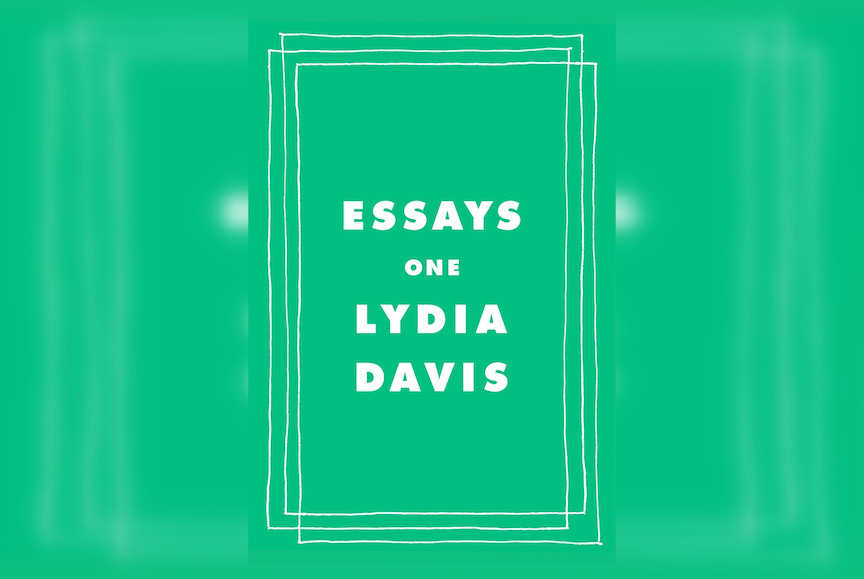For nearly 50 years, Lydia Davis has been producing short stories, novels, translations, and essays that try to say as much as possible in as few words as possible. She is considered the master of flash fiction, and some of her stories need only two sentences to leave a lasting mark. Her preoccupation with brevity, she says in her new book, Essays One, stems from her experiences writing poetry as an adolescent. But, at some point growing up, Davis realized that being a poet would not be a suitable profession for her. She didn’t want to be a novelist either, so she adopted short fiction as a way of channeling poetic energy. In Essays One, Davis’s talents as a writer of both poetic and prosodic tendencies are on full display.
The book is the first of a two-part volume of Davis’s nonfiction work. This collection focuses on “writing” broadly while the second volume focuses on translation. Essays One is a compilation of pieces from every decade between the 1970s and today. In nine sections, Davis reflects on her artistic influences, revisits many of her personal literary projects, and prescribes writerly tips and tricks. The result is a 500-page book of writing about literature, visual arts, history, religion, among other topics. On the whole, the essays in each section are sharp in their analysis, but the sections themselves don’t communicate an overlying structure or purpose. It’s not apparent, for example, why certain sections, like the two called “The Practice of Writing” or the three called “Writers,” couldn’t have been, in more typical Davis fashion, condensed. A reader might wonder, then, why Davis chose to publish this collection now, or what her exact motivations were for compiling it this way.
In an essay titled “From Raw Material to Finished Work: Forms and Influences II,” she explains that she’s been spending time rereading old work and she’s found that memory is a powerful and complicated catalyst for her creativity. She writes, “I wonder … that certain material or settings might trigger a response in a writer that awakens subliminal memories of earlier responses to a significant piece of writing she has studied in the past.” So much of this collection is born of Davis’s expert self-examination; of her thinking about her own thinking, and her mind’s pursuit of self-understanding. “The mind is like a house, or an apartment to a city-dweller,” she writes, and in it are “rooms, unsuspected, around corners, always another where you thought [the house or apartment] ended.” Essays One takes readers through the “unsuspected” rooms of Davis’s mind: an endless series of queries about work habits, elements of writing, works of art, the difficulties of translation, photography and clothing, the concept of time, and even her family’s strange, fortuitous connection to Abraham Lincoln. Her love for language is what drives her curiosity and guides her penetrative eye; the journey is rendered in exquisite prose.
Despite how polished and full of clarity Davis’s writing is, the collection itself suffers from a lack of narrative or critical coherence. The sections about writing are oddly juxtaposed with sections of her criticism of visual artists, which are much shorter, denser, and altogether less demonstrative of the habits and styles she discusses elsewhere. Even the sections about writing—“Writers” and “The Practice of Writing”—do little to strengthen one another, as she uses both pieces to describe her influences and the specific things she admires in writing. As a result, the reader ricochets from one subject to the next, from personal essays to topical essays to aesthetic critiques, back to personal essays and many places in-between. The experience of moving through the collection is akin to taking a long-distance drive without using a roadmap. Buoyed along primarily by the lift in the writing, to read Essays One sequentially from cover to cover is to float in Lydia Davis’s limbo.
Part of this limbo-like feeling comes from her persistent and often repetitive questioning. Davis sometimes crafts entire half-page paragraphs of only questions, most of which are rhetorical, some of which are relevant, very few of which are answered. A bit of her thinking, in this sense, feels unfinished. For example, in an essay that praises Thomas Jefferson as an independent thinker, she attributes his business success to “his seven-field crop rotation system” and “pure pleasure in doing the [work] himself” without making a single allusion to the 600 slaves he owned. Another frustrating oversight occurs, ironically, in an essay called “Thirty Recommendations for Good Writing Habits,” when she writes that a writer must adhere to “accurate factual information about how a thing works, if you’re writing about it.” Later in the same paragraph, she writes: “This means that over time, you will learn a good deal.” Is this really the best insight a writer of her brilliance can offer? She seems less present in moments like these.
Davis is at her best when she is most personal and open, when the lens of her analytical mind is turned inward and she blends her criticism with examples and experiences from her own life, as she does most acutely in the collection’s ninth and final section called “The Bible, Memory, and the Passage of Time.” Earlier, Davis writes about how reading a book can collapse time, how “we feel we are reading in the same moment the writer is writing … there is no interval.” Only here, in the last section of the collection, does she achieve this closeness between herself and her reader. It happens in “As I Was Reading,” a masterpiece of personal essay writing in which she asks simply, “What do I want to know?” She begins with a question (what is the definition of a millennium?), researches it, finds instead an interesting article about hats in antiquity, which inspires her to look up facts about ancient Greek culture, from which she remembers her interest in Christianity that, in turn, brings her to other articles about European languages and language families, and so on and so on, all in an effort to track the meandering movement of her agile mind. She may not know what she’s after or how to get there, but there are few writers today who are as easy, and enjoyable, to follow as Lydia Davis.



